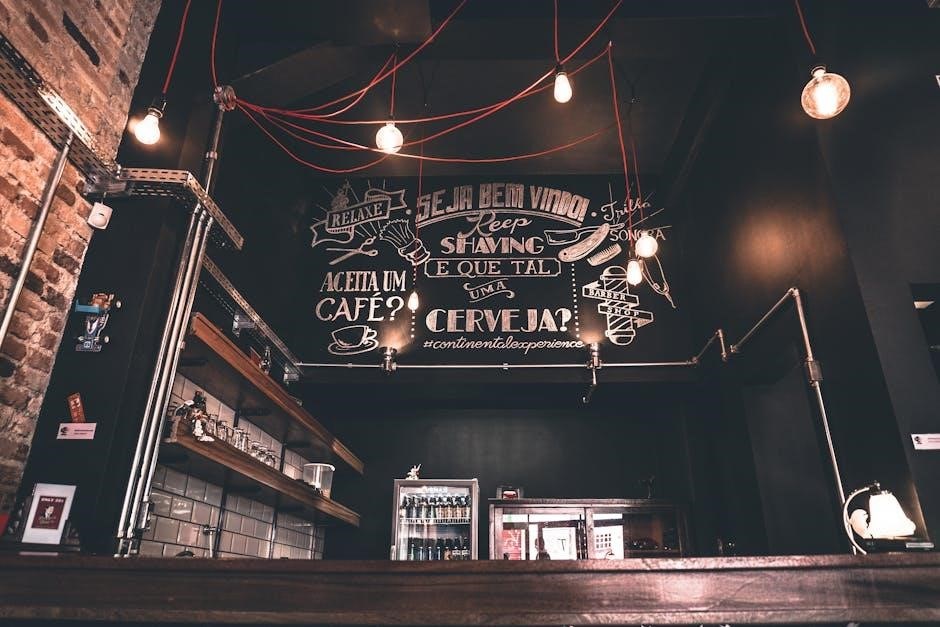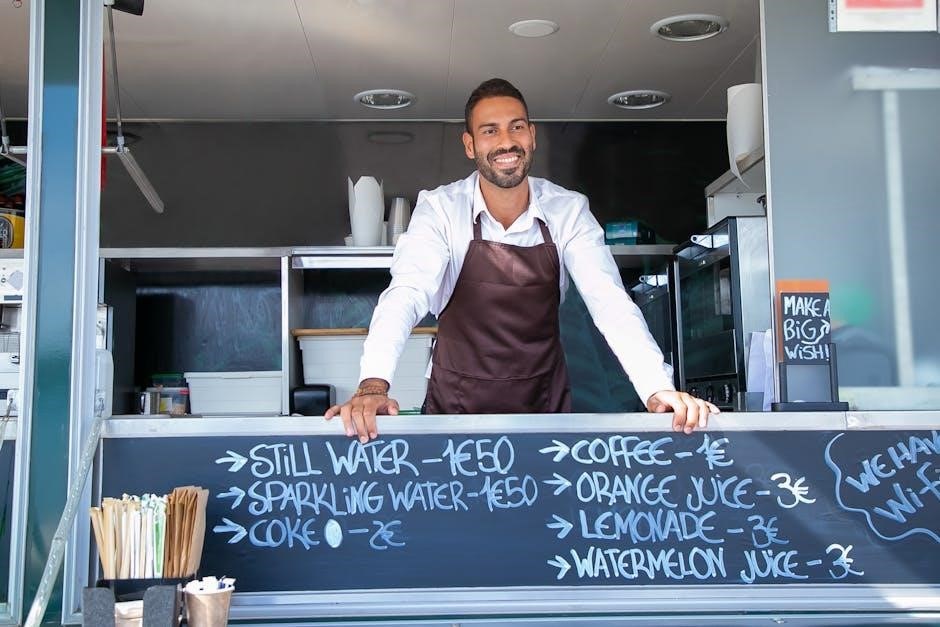Executive Summary
The coffee bar business plan outlines the strategic approach to launching and operating a successful cafe, detailing start-up costs, operational strategies, and marketing efforts to attract investors.
1.1. Business Overview
The coffee bar aims to offer a unique, high-quality experience, serving specialty coffee and light bites in a cozy, modern setting. Targeting urban professionals and coffee enthusiasts, it focuses on sustainability, excellent customer service, and a welcoming ambiance to build a loyal customer base and establish a strong community presence.
1.2. Mission Statement
The mission is to deliver exceptional coffee experiences by sourcing ethically-produced beans, fostering a welcoming atmosphere, and building lasting connections with customers and the community, ensuring every sip contributes to a sustainable and enjoyable lifestyle while exceeding customer expectations through quality and service.
1.3. Objectives and Keys to Success
Key objectives include achieving profitability within the first year, building a loyal customer base through high-quality products, and establishing a strong brand identity. Success hinges on effective marketing, excellent customer service, and maintaining operational efficiency to ensure long-term sustainability and growth in the competitive market environment.

Business Description
The coffee bar aims to provide high-quality specialty coffee, creating a welcoming ambiance for coffee lovers. It focuses on serving premium beverages and pastries, targeting a diverse customer base seeking unique experiences.
2.1. Concept and Vision
The coffee bar concept revolves around creating a cozy, inviting space offering artisanal coffee, specialty drinks, and light bites. Our vision is to become the community’s go-to destination, blending quality, sustainability, and a passionate approach to coffee culture, fostering meaningful connections and exceptional customer experiences daily.
2.2. Unique Selling Proposition (USP)
Our coffee bar stands out by offering ethically sourced, small-batch coffee beans and unique flavor profiles, combined with a personalized customer experience. The cozy, modern ambiance and commitment to sustainability create a distinct edge, making us a preferred choice for coffee enthusiasts seeking quality and authenticity.
2.3. Target Market and Customer Profile
Our target market includes young professionals, students, and coffee enthusiasts aged 18-45 seeking premium coffee. They value quality, sustainability, and a welcoming atmosphere. This demographic is active in urban areas, aligning with our strategic location and modern cafe design.

Market Analysis
The market analysis highlights growing demand for specialty coffee, evolving consumer preferences, and competitive dynamics, providing insights to position the coffee bar effectively within the industry landscape.
3.1. Industry Overview
The specialty coffee industry is experiencing steady growth, driven by increasing consumer demand for high-quality, ethically sourced products. The market is fragmented, with both large chains and independent cafes competing, creating opportunities for unique, localized coffee bars to thrive and differentiate themselves through superior customer experiences and product offerings.
3.2. Market Trends and Growth Opportunities
Current trends include a rise in demand for premium, sustainably sourced coffee and personalized menu options. Growth opportunities exist in targeting health-conscious consumers with plant-based alternatives and expanding into digital ordering and delivery services to meet the growing demand for convenience and online engagement.
3.3. Competitive Analysis
Local cafes and national chains dominate the market, focusing on quality and customer experience. Key competitors emphasize unique menu offerings and loyalty programs. By differentiating through superior service, exclusive blends, and a welcoming atmosphere, the coffee bar can carve a niche and attract a loyal customer base effectively.
Menu and Pricing Strategy
Specialty coffee drinks, artisanal food, and competitive pricing will attract diverse customer preferences, ensuring the coffee bar stands out in a crowded market with affordable luxury.
4.1. Product Offerings
The coffee bar will feature premium espresso-based drinks, specialty teas, fresh-baked pastries, and light bites. Seasonal menu items and signature beverages will enhance the offerings, appealing to a wide range of customer preferences and dietary needs while maintaining quality and consistency.
4.2. Pricing Strategy
The coffee bar will implement a competitive pricing strategy, balancing affordability with premium quality. Signature drinks and seasonal specials will be slightly higher-priced, while standard beverages will remain competitively priced to attract a broad customer base and ensure profitability.
4.3. Sample Menu
The menu features a variety of specialty coffees, teas, and light bites. Highlights include espresso-based drinks, seasonal lattes, artisanal pour-overs, and a selection of pastries, sandwiches, and salads to complement the beverage offerings, ensuring a diverse and appealing experience for customers.
Operations Plan
The coffee bar will operate in a prime location with an efficient layout, utilizing high-quality equipment and supplies. Staff will be trained to ensure excellent service and product quality, focusing on sustainability and customer experience.
5.1. Location and Layout
The coffee bar will be situated in a prime, high-traffic location, ensuring visibility and accessibility. The layout will be designed for efficiency, with an open, inviting atmosphere that promotes customer comfort and ease of service, while incorporating sustainable practices to reduce environmental impact;
5.2. Equipment and Supplies
The coffee bar will be equipped with high-quality espresso machines, grinders, brewers, and point-of-sale systems. Essential supplies include premium coffee beans, syrups, milk, and disposable cups. Sustainability is prioritized with eco-friendly packaging and energy-efficient appliances. Regular maintenance ensures optimal performance and longevity of equipment.
5.3. Staffing and Training
The coffee bar will hire friendly, skilled baristas, managers, and support staff. Comprehensive training programs will cover coffee preparation, customer service, and safety protocols. Ongoing training and performance incentives will ensure high-quality service and employee retention, fostering a positive work environment.
Marketing and Sales Strategy
The coffee bar will implement a robust marketing plan, including branding, promotions, and digital engagement. Social media campaigns, loyalty programs, and local partnerships will drive customer acquisition and retention.
6.1. Branding and Promotion
The coffee bar will establish a strong brand identity through a unique logo, vibrant packaging, and consistent messaging. Promotional activities include social media campaigns, in-store events, and local collaborations to create a welcoming and memorable customer experience that fosters loyalty and attracts new patrons effectively.
6.2. Digital Marketing
Leveraging platforms like Instagram and Facebook, the coffee bar will execute targeted ads, influencer partnerships, and email campaigns. A user-friendly website with online ordering and delivery options will enhance customer engagement and drive sales, ensuring a robust online presence and seamless digital experience for patrons.
6.3. Customer Loyalty Programs
Implementing a rewards card and mobile app, customers earn points for every purchase. Exclusive discounts, free drinks, and early access to new products will foster repeat visits and long-term patronage, building a loyal customer base and encouraging retention through personalized experiences.

Financial Plan
Detailing start-up costs, revenue projections, and break-even analysis, this section provides a comprehensive financial overview to ensure sustainability and profitability, attracting potential investors with clear monetary strategies.
7.1. Start-Up Costs
Start-up costs include equipment, lease deposits, interior design, permits, and initial inventory. Using a professional template like Upmetrics helps accurately estimate expenses, ensuring a comprehensive financial foundation for the coffee bar’s launch, as seen in examples like Stud Coffee’s detailed breakdown.
7.2. Revenue Projections
Revenue projections estimate the coffee bar’s financial performance, detailing expected income from sales, considering factors like average customer spend and foot traffic. Templates like Upmetrics provide structured forecasts, ensuring realistic targets based on market analysis and customer demand patterns.
7.3. Break-Even Analysis
A break-even analysis calculates the point at which the coffee bar’s revenues equal its total costs, helping determine profitability timelines. It considers fixed and variable costs, average sale, and required daily customer traffic to project when the business will start generating profit.
Management Team
The management team includes experienced professionals with expertise in coffee preparation, customer service, and business operations, ensuring effective leadership and smooth execution of the coffee bar’s strategic objectives.
8.1. Founders and Roles
The coffee bar is founded by Alexandra Rotaru, Oana Savescu, and Alina Stancu, each bringing unique expertise in coffee preparation, customer service, and business management. Their collective vision aims to create a welcoming, high-quality cafe experience in Bucharest, Romania.
8.2. Key Personnel
The coffee bar employs a head barista overseeing beverage quality, an operations manager handling daily logistics, a marketing specialist driving promotions, and a financial advisor ensuring budget adherence. Together, they ensure seamless operations, quality service, and customer satisfaction.
8.3. Organizational Structure
The coffee bar operates under a flat hierarchical structure, with founders overseeing overall strategy, while key personnel manage specific departments. The head barista leads beverage preparation, the operations manager handles logistics, and the marketing specialist drives customer engagement, ensuring efficient workflow and clear communication channels.

Funding Requirements
The coffee bar requires an estimated $200,000 in initial capital to cover start-up costs, including equipment, location rental, and marketing. Funds will be sourced through investor contributions and small business loans.
9.1. Capital Needs
The coffee bar requires an initial investment of $200,000 to cover equipment, location rental, marketing, and initial operational costs. Funds will be allocated to secure a prime location, purchase high-quality equipment, and establish a robust marketing strategy to attract customers and build brand awareness.
9.2. Funding Sources
Funding will be sourced through a combination of personal savings, bank loans, and private investors. Additional capital may be raised via crowdfunding platforms to support initial setup and operational costs, ensuring a diversified financial foundation for the coffee bar’s launch and growth.
9.3. Investment Ask
We are seeking $200,000 in initial investment to cover start-up costs, including location setup, equipment, and marketing. Investors will receive a 20% equity stake in the coffee bar, with projected returns of 15% annually, ensuring a strong ROI within the first three years of operation.

Risk Management
Risk management involves identifying potential challenges, such as market competition and economic downturns, and implementing strategies to mitigate their impact on the coffee bar’s operations and profitability.
10.1. Potential Risks
Potential risks include high competition, economic downturns reducing consumer spending, supply chain disruptions, and fluctuating costs of raw materials. These factors could impact profitability and operational stability, requiring proactive mitigation strategies to ensure long-term success.
10.2. Mitigation Strategies
Diversify suppliers to reduce supply chain risks, implement loyalty programs to retain customers, and adopt flexible pricing strategies to adapt to market changes. Maintain a financial reserve to address unexpected costs and ensure operational continuity during economic fluctuations.
10.3. Contingency Plans
Develop a backup plan for supply chain disruptions, identify alternative suppliers, and create an emergency fund to cover three months of operations. Implement a recovery strategy for unexpected events, ensuring minimal downtime and maintaining customer trust during challenging times.
The coffee bar business plan outlines a clear vision for future success, detailing strategic approaches to achieve long-term growth and customer satisfaction while maintaining high-quality products and exceptional customer experiences.
11.1. Summary of the Plan
The coffee bar business plan effectively outlines the goals, market strategies, and financial projections to ensure sustainable growth. It emphasizes creating a unique customer experience, leveraging digital marketing, and maintaining high-quality products to achieve long-term success and customer satisfaction in a competitive market environment.
11.2. Vision for the Future
The coffee bar aims to expand to multiple locations, becoming a community hub known for quality and sustainability. By innovating menu offerings and enhancing customer experiences, the business plans to solidify its position as a leader in the specialty coffee market while fostering social and environmental responsibility.
11.3. Call to Action
Join us in bringing this vision to life by investing in our coffee bar. Together, we can create a thriving business that delivers exceptional experiences and fosters community connections. Contact us today to explore partnership opportunities and help shape the future of specialty coffee.

Appendices
Includes financial statements, market research data, and legal documents supporting the coffee bar business plan, providing detailed backup for strategic decisions and operational planning.
12.1. Financial Statements
Includes income statements, balance sheets, and cash flow projections, providing a comprehensive financial overview of the coffee bar’s performance and supporting the business plan’s viability for investors and stakeholders.
12.2. Market Research Data
Presents detailed market trends, customer demographics, and competitive analysis, providing insights into consumer preferences and the coffee bar industry’s growth potential to support strategic decision-making and validate the business plan’s assumptions.
12.3. Legal and Operational Documents
Includes licenses, permits, contracts, and employee agreements, ensuring compliance with regulations. Operational manuals, health and safety protocols, and supplier contracts are also provided to maintain smooth operations and legal adherence for the coffee bar business.
